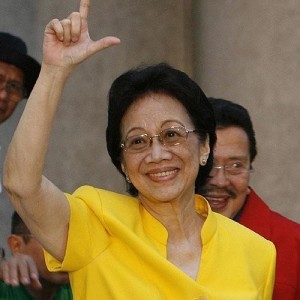 Note: Our accounts contain the personal recollections and opinions of the individual interviewed. The views expressed should not be considered official statements of the U.S. government or the Association for Diplomatic Studies and Training. ADST conducts oral history interviews with retired U.S. diplomats, and uses their accounts to form narratives around specific events or concepts, in order to further the study of American diplomatic history and provide the historical perspective of those directly involved.
Note: Our accounts contain the personal recollections and opinions of the individual interviewed. The views expressed should not be considered official statements of the U.S. government or the Association for Diplomatic Studies and Training. ADST conducts oral history interviews with retired U.S. diplomats, and uses their accounts to form narratives around specific events or concepts, in order to further the study of American diplomatic history and provide the historical perspective of those directly involved.
Opposing the rule of Philippines president Ferdinand Marcos, Senator Benigno Aquino returned from exile in the U.S. in August 1983, only to be assassinated upon his arrival in Manila. Public outrage in response to this and to the regime's corruption led to calls for Marcos' removal. Corazon Aquino, the widow of Benigno, was convinced to run against Marcos in the election of February 1986.
Once election results were released, Marcos claimed victory despite accusations of vote tampering and fraud. At Corazon Aquino's urging, protestors took to the streets to demand Marcos' removal. On February 25, 1986, Corazon Aquino was inaugurated as president, a victory officially recognized by the U.S. That same day Marcos fled the country for permanent asylum in Hawaii, ending twenty years of autocratic rule.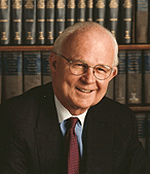 This account was compiled from an interview by ADST in 2003 with Stephen Bosworth, U.S. Ambassador to the Philippines from 1984-1987. You can read the entire account on ADST.org.
This account was compiled from an interview by ADST in 2003 with Stephen Bosworth, U.S. Ambassador to the Philippines from 1984-1987. You can read the entire account on ADST.org.
Bosworth (right): Our relationship with Marcos was under great pressure both from our own congress and elements in the Philippines...There was something of a course correction policy toward the Philippines... The Philippines, of course, is a very curious place because it is in Asia, but it's not really of Asia in many respects. Someone joked that probably given my experience in Central America I was as well suited to go to the Philippines as anyone could have in terms of background.
[In April 1984] the Philippines is getting ready for national assembly elections. This was the first significant political event since Aquino's assassination. The first electoral process of any note that had taken place since Marcos had lifted martial law, which I think, was done in '81 or '82 or something like that...We were distancing ourselves from Marcos and from the Malacañang palace.
There was a political legal process that had been launched after Aquino's assassination in response largely to pressures from the U.S. Congress to try to ascertain what actually had happened and who was responsible. It was a national commission that was interviewing witnesses and laboring away on this subject. This election was scheduled for May of 1984 and was the first time that members of the democratic opposition were allowed to run for office.
The Philippines was a very tense place. Marcos had ruled there since 1965. He had imposed martial law in 1972. He had lifted martial law in the early '80s. There was an unbelievable level of corruption in the country. The military was both corrupt and repressive. The communist insurgency known as the New Peoples Army had begun to attract the attention of Washington intelligence analysts because of their growth. The democratic opposition lacked someone to rally around. Corazon Aquino, Benigno's widow, was there. She at that point was not very active politically other than as a symbol.
Many people had begun to accuse us of having propped Marcos up and having kept him in power. We were trying to distance ourselves from him but not to the extent to which we would bring him down. Reagan and Marcos had what they considered to be a close personal relationship. I couldn't quite understand that because they had never spent all that much time together.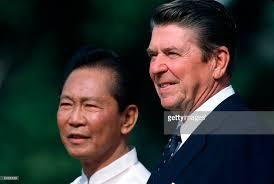
Reagan had been elected on a platform, which included among things the need for American support for longstanding friends. This was after the Shah had fallen in Iran and Somoza and Nicaragua, so there was a belief deeply held in the Reagan administration that we had to stick with our friends and Marcos was a friend...
Jeane [Kirkpatrick] came to the Philippines in the first two months that I was there and we called on Marcos and had a long conversation with him. I got her together with some members of the democratic opposition as well as other people in the Marcos government. I think she came away with a clear understanding of the complexity of what we were facing and just to say that we supported Marcos was not sufficient. We had to also be supportive of a democratic process.
Without being too blatant about it you make it clear that some elements of the American relationship are dependent on their beginning, and in this case Marcos beginning, to allow more space to the democratic opposition and express concern over the gross extremism on the left. This, of course, gave Marcos the impression that we were pushing him, which we were indeed doing...
Washington was more or less backing us on that. Marcos had to change or our relationship had to change, otherwise we were placing our longer term interests in the Philippines at risk, because it was not in our interest to prop Marcos up beyond the time when his own national constituency didn't want him.
Finally, in the fall of '85 the pressure on Marcos had become quite severe... I was continuing to tell him very strongly that he had to allow more space for the opposition, he had to do something about bringing those who most people thought had been responsible for Aquino's assassination to justice.
So, in November of '85, while being interviewed on one of the Sunday morning talk shows on American television, suddenly Marcos said, "well, I'm tired of you guys pressing me and I'm going to have an election and then I'll show you who really deserves to run the Philippines."
He called an election, the so-called "snap election," in November. The election was scheduled for early February. Corazon Aquino was persuaded by some people in the opposition that she should be a candidate. She and a fellow named Salvador Laurel fought it out as to who would be the presidential candidate. She won and Laurel became vice president. [Laurel] was constantly besieging me to try to get me an interview with her and persuade her that they should be reversed. 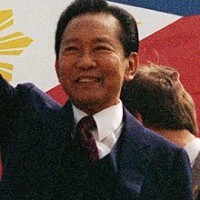 The U.S. position in the Philippines was really in a way kind of unique. We were, on the one hand in the minds of many Filipinos, seen as the great Satan of the West. On the other hand we were seen as the deus ex machina from whom all solutions would come if only we decided that's what we wanted to do. There was a degree of dependence, if you will, on the U.S. that was very much exaggerated in many respects. People really thought that Marcos was still there because we wanted him to still be.
The U.S. position in the Philippines was really in a way kind of unique. We were, on the one hand in the minds of many Filipinos, seen as the great Satan of the West. On the other hand we were seen as the deus ex machina from whom all solutions would come if only we decided that's what we wanted to do. There was a degree of dependence, if you will, on the U.S. that was very much exaggerated in many respects. People really thought that Marcos was still there because we wanted him to still be.
December and January were given to campaigning. Marcos himself was not in good health, but he had a tremendous will; he was out there on the campaign trail, making speeches and shaking hands. I think from the beginning he thought he was going to win easily. He was out of touch with popular sentiment.
I think his fall back was he thought, well, if I don't win I can always cheat enough to win. What he didn't anticipate was that the level of international interest would be as great as it was and the presence of the American journalists, foreign journalists and the various election inspection observation teams that came from around would be as great as they were.
So, his ability to win it by cheating became very constrained. To this day no one really knows who won that election. Marcos, however, then within the week after the elections, sort of seized the process and managed through his minions and the national assembly predictably to introduce the vote saying that he had won.
Well, that wasn't the end of it, contrary to what I think he had assumed to be the case, because then the public antipathy began to rise. The opposition became even more vigorous.Because of pressures in our own congress and in our own public, we remained very engaged. We came to the position of pushing away from Marcos in that week or two after the election.
There was one statement out of the White House saying, well, there was probably some cheating on both sides, at which point the Filipinos went nuts. I fired back a message to [Secretary of State George] Shultz and to the White House saying that we couldn't stay on that position. Fortunately, over the next three or four days, with a lot of heavy lifting from George Shultz, the White House issued another statement that said the government had not run a fair election.
Phil Habib came out as an envoy from the president about a week after the elections, basically to gain us some time. I mean there was nothing he could do other than go around and see a lot of people, which he and I did including Marcos and Aquino. Phil came away from that week convinced that Marcos was no longer capable of governing because he didn't have the support of the Filipino people anymore. 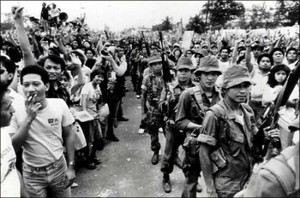 Marcos' forces basically knew that the military was plotting a coup. We knew it in the embassy as well. I had been sending word back to the coup plotters to stop it, not to do it, because as much as I thought Marcos should go, I thought it would be in some ways be totally disastrous to have him replaced by a military government. This group of colonels and young officers took refuge in one of the military camps out on the outskirts of Manila.
Marcos' forces basically knew that the military was plotting a coup. We knew it in the embassy as well. I had been sending word back to the coup plotters to stop it, not to do it, because as much as I thought Marcos should go, I thought it would be in some ways be totally disastrous to have him replaced by a military government. This group of colonels and young officers took refuge in one of the military camps out on the outskirts of Manila.
CNN had the capability to telecast directly via satellite and they had a cameraman and a reporter in the camp where the military people were holed up. So, I alerted Washington; it was early morning back there. They were watching it on CNN. They knew more about what was happening on the ground there than I did in the embassy because I didn't have access to CNN.That evening I was in contact with Mrs. Aquino's camp and her directly. She had been down in the central Philippines. We were very concerned about her safety and I offered her refuge on a U.S. naval vessel that happened to be in the vicinity. Tthey were very concerned that Marcos would try to knock her out by basically assassinating her, which was not by any means unthinkable.
She wisely concluded that she didn't want to do that. She didn't want to appear to be under U.S. sponsorship, so she took refuge for the night in a convent and then early the next day came back to Manila.
In the meantime, Cardinal Jaime Sin had gone on Radio Veritas, a very small transmitter sponsored by the Catholic church, and said to the Philippine public that you've got to go help [the soldiers], take them food. Of course at that point people began to pour out into the streets and once that happened it became clear that this may have started as a military coup, but was much more than that now.
[Corazon Aquino] came back the next morning and she sort of took visible control...which was very important because I was very conscious of the need not to be seen as to be putting the U.S. behind a military coup attempt. Since we had pretty much concluded publicly that she had won the election, there was nothing wrong with putting our support behind her.
For the next two days my role consisted primarily of 1) keeping Washington fully informed and 2) warning Marcos directly on the phone that he should not move by force against [the soldiers]. He should not do anything that would jeopardize the safety of hundreds of thousands of Filipino civilians who were out in the streets supporting Mrs. Aquino and demanding Marcos' resignation. Finally, over the next couple of days the situation played out so that we issued a statement, the U.S. from Washington, which I then transmitted, to Marcos and others saying in effect the time has come you should leave...
With that we had removed the mandate of heaven from him. He was done. Then it was a question of how to get him out safely... His first words to me were, "I'm terribly disappointed. You don't understand. Your government doesn't understand. This is a military coup and I have to resist it."
I said, "Well, we don't agree that it's a military coup any longer. We think that it is something bigger than that. Anyway, these are my instructions." I then got back to him the next day. He was in the palace with his family and his grandchildren.We offered him three alternative routes out;, basically by land and by sea and by air. He opted for the air route and he sent some of his minions and his baggage out by boat. We took him out by helicopter. We took him to Clark where he spent a few hours and then we put him on a plane and he went out first to Guam and then to Hawaii. Of course, he died in exile...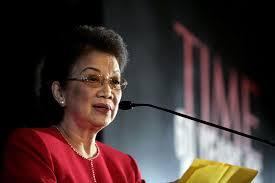 There is a big Filipino presence in Hawaii. It was very important to us and to President Reagan in particular that we not allow him to be harassed, that we would give him safe haven basically in the United States, but we wouldn't let him go back to the Philippines. Well, he never really had a complete safe haven because the legal people began coming after him very quickly. Mrs. Aquino comes to power and a great upsurge of national spirit and good feeling. The U.S. for a time at least was, we were heroes, because we had taken him out. I remember going down to call on her the day after Marcos had left.
There is a big Filipino presence in Hawaii. It was very important to us and to President Reagan in particular that we not allow him to be harassed, that we would give him safe haven basically in the United States, but we wouldn't let him go back to the Philippines. Well, he never really had a complete safe haven because the legal people began coming after him very quickly. Mrs. Aquino comes to power and a great upsurge of national spirit and good feeling. The U.S. for a time at least was, we were heroes, because we had taken him out. I remember going down to call on her the day after Marcos had left.
As I came out having exchanged statements of good feeling with her and her principal aides, a big crowd of people on the outside all started cheering for the U.S. and me. It was really kind of an extraordinary experience since I previously used to go into my office at the embassy driving through large crowds of demonstrators all saying, "Bosworth go home." Some of them had little clips underneath saying "Bosworth go home and take me with you." Filipinos had a sense of humor if nothing else.
I had a very close relationship with Mrs. Aquino in many ways, personally of course. It was incumbent upon me just because of circumstances to try to interpret her to Washington and interpret Washington to her. This was of course the normal role of an ambassador, but in this case it was more demanding because she had so little experience. She was a woman of tremendous integrity and great courage and I liked her generally and personally. Her great supporter turned out to be George Shultz. Others in the Reagan administration were less enthusiastic about her and many questioned her ability to run the country effectively. I always considered that she was sort of the mother of the Philippines.
Her role essentially was to oversee the reestablishment of democratic institutions. There were missed opportunities. The government was not very coherent. It was torn from the right and from the left. There were great divisions within the government so that particularly in terms of economic policy, there were opportunities that were lost that were not regained until she finished her presidency and Fidel Ramos became president. That was a time of considerable consolidation and forward movement economically. Under her the Philippines became a democracy again, with all of its imperfections.
